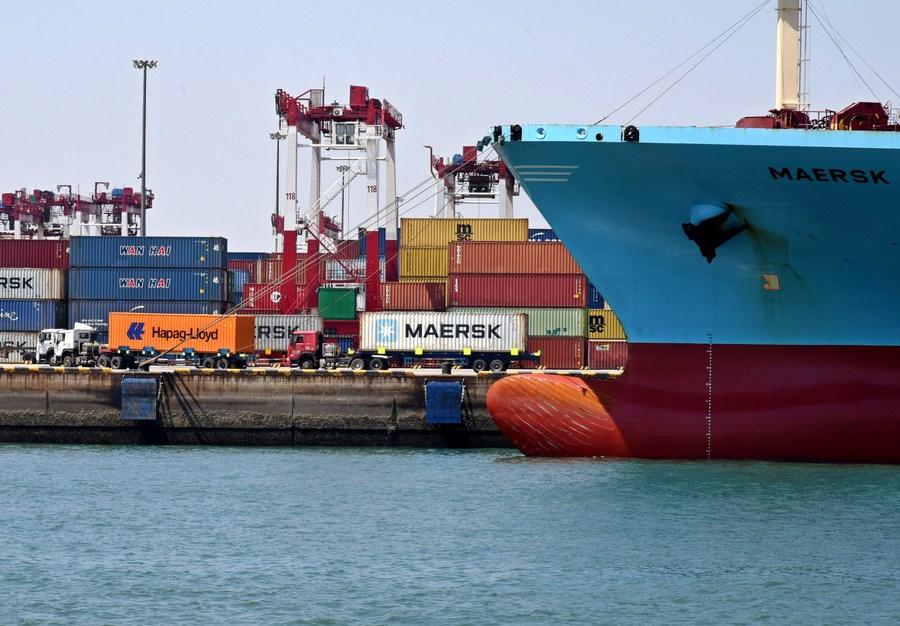
Photo taken on May 1, 2022 shows a container vessel docking at the Qianwan Container Terminal in Qingdao, east China's Shandong Province. (Xinhua/Li Ziheng)
BEIJING, June 9 (Xinhua) -- Multiple measures have recently been rolled out at both national and local levels in China to prop up industrial and supply chains stability and promote foreign trade, as key regions pick up orderly resumption of work and production after resurgences of COVID-19 in recent months, reported Economic Information Daily on Tuesday.
The Ministry of Commerce (MOC) , the General Administration of Customs (GAC) and other relevant departments have made successive efforts to provide enterprises with specific services that bolster foreign trade. Local governments have also been proactively supporting foreign trade firms to solve difficulties in the supply of raw materials and key components during their resumption of production.
-- Resume production by unclogging logistics
As many companies strive to fulfill the backlog of orders, they are facing difficulties in the transportation of raw materials and some key components, to which end relevant departments have taken intensive measures to ensure the smooth operation of logistics.
A guideline released on May 26 by the State Council has specified measures to support foreign trade enterprises affected by the epidemic in their work resumption and ensure unimpeded logistics of foreign trade, which include identifying the list of key enterprises and personnel in foreign trade related sectors and provide precise service in production, logistics and employment.
MOC spokesperson Gao Feng on the same day said at a news briefing that China will make all-out efforts to help foreign trade enterprises stabilize industrial and supply chains, ensuring smooth transportation of both domestics and international cargoes.
Specifically, the MOC is committed to work with relevant departments to guide local authorities in establishing service mechanisms for work resumption of foreign trade enterprises, unclog the logistics of foreign trade firms by issuing them special passes for vehicles transporting key supplies, as well as improve customs clearance procedures and operational efficiency, ensuring smooth transportation of important parts, equipment and products by sea, rail and air.
Earlier on, the GAC issued ten measures to stabilize foreign trade and made relative arrangements to ensure smooth circulation of industrial and supply chains in key regions. Customs authorities in the cities such as Shanghai, Nanjing, Guangzhou, Shenzhen and Haikou have been releasing new measures to support export-oriented enterprises. For instance, five customs in the Yangtze River Delta have jointly issued a notice to ensure safe and smooth operation of the regional industrial and supply chains.
-- Achieve better growth by reducing costs
Supply chain obstacles not only affect the production of enterprises, but also their profits. "To stabilize the fundamentals of foreign trade, one has to work on both ends of production and market, either should be neglected," said Gao Lingyun, a researcher with the Chinese Academy of Social Sciences.
While alleviating supply chain challenges caused by blocked logistics, other problems faced by enterprises should also be underlined, especially the sharp drop in corporate profits caused by climbing costs in labor, production and transportation, Gao Lingyun said.
Relevant departments are taking targeted actions to address these issues as well. For example, the MOC has pledged to help enterprises tackle practical issues, by guiding local authorities to identify and deal with common problems affecting foreign trade enterprises, and pinpointing urgent demands of enterprises to accordingly provide accurate services.
In addition, multiple departments and local governments are actively implementing free trade rules including the Regional Comprehensive Economic Partnership (RCEP) to ensure the safety and stability of the foreign trade industrial and supply chains, and to reduce costs and increase efficiency for enterprises.
For instance, the Guangzhou Customs and other relevant departments have been continuing to strengthen the introduction of RCEP policy and actively guide enterprises to properly arrange the layout of industrial and supply chains in accordance with tariff concessions and differences in rules of origin, so as to ensure that enterprises can enjoy the maximum of benefits from preferable policies.
-- Improve competitiveness by strengthening resilience
Taking a step further from the stabilization of industrial and supply chains, it is also important to strengthen the resilience of them by improving the ability of Chinese foreign trade enterprises to withstand external uncertainties and challenges.
Amid the complex and volatile environment of today's world economy, a fundamental move for securing orders and expanding markets is to strengthen the overall resilience of the industrial chains, according to Gao Lingyun, who also pointed out that the relatively strong resilience has been an advantage of China's foreign trade.
Based on recent surveys on relevant enterprises, leading enterprises with vertically integrated industrial chain are mostly able to maintain a high operating rate and profitability by virtue of their advantages in capital, technology, scale and brand.
With the ability to continuously invest in R&D and equipment upgrade, these companies are more likely to see constant increase in their competitive advantage and market share, according to Gao Shiwang, director of the industry development department of the China Chamber of Commerce for Import and Export of Machinery and Electronic Products.
"This reminds us of the importance of looking at the situation from an overall perspective of the industrial and supply chains and improving the competitiveness of upstream and downstream enterprises," Gao Shiwang said.
In the face of supply chain adjustment and external pressure, China's opportunity lies more in maintaining the current core competitiveness while optimizing the upgrade of industrial chain through increasing production and independent R&D capabilities, said Zhuo Hong, representative with Industrial Securities.
(Edited by Yu Huichen with Xinhua Silk Road, yhc0267@163.com)




 A single purchase
A single purchase









